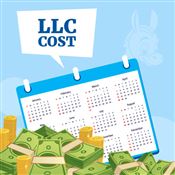What is an LLC
Forming an LLC is one of the simplest ways to protect yourself and your business. But is it the right fit for you? Learn everything you need to know.
 |
Although they're newer than other business structures, LLCs are a top choice among business owners. Especially for small- to medium-sized companies.
They're simple, flexible, and offer liability protection—a hybrid of sole proprietorships/partnerships and corporations. This gives entrepreneurs the best of both worlds. But they're not always the best choice for everyone.
Here's everything you need to know about an LLC, from what it is to how to form one. Check to see if it's what your business needs.
What Is a Limited Liability Company (LLC)?
An LLC, or "Limited Liability Company," is a business structure that offers personal liability protection. It draws a clear line between the company's assets and the owners' personal ones.
This protects business owners if their company faces issues like lawsuits, debts, and bankruptcy (liabilities).
You won't risk losing your house, car, and other personal properties. Even if your business struggles or goes under.
Advantages of LLCs
LLCs offer many other benefits to business owners because of their unique nature. Let's discuss some of them below.
Personal Liability Protection
LLCs are considered separate entities from owners. This gives business owners personal liability protection that safeguards their personal assets.
The government or banks can't seize a member's belongings or properties if the business goes under—only what the company owns.
The only condition is they have to establish that the company's assets are separate from the members' assets. LLC members have to show they're not using the business' finances for their personal purchases.
Simple Taxation
LLCs can opt for what's called "pass-through taxation." This means they don't have to pay taxes twice on the same income, unlike corporations. Owners will just file them as part of their personal income tax returns.
They can also choose to be taxed like corporations or S corporations. More on that in the taxing section.
The Simplest Way to Establish Credibility
Forming an LLC is also the simplest way to formalize your small business and establish it as a legitimate company. You just have to file your Articles of Organization with your Secretary of State's office to officially become an LLC.
It's a legal document containing the company's basic information, like its business name, address, and registered agent. You need to file it to turn your company into an LLC.
Becoming an LLC will also allow you to open a separate business bank account since your company will now be treated as a separate entity. This can make it easier to get business financing. It'll also make separating your personal and the company's finances more convenient.
Anyone Can Start One
Anyone can turn their business into an LLC. In fact, you don't have to be a U.S. citizen or resident to form one.
Only institutions like banks and insurance companies aren't allowed to turn their businesses into LLCs.
No, you don't need a lawyer to form an LLC.
You can file the documents yourself. Online incorporation services can also file the paperwork on your behalf. You can still hire a lawyer if you need more guidance.
Owners are called "members" in LLCs, and you can have as many as you want with this structure. You can also start an LLC with yourself as the sole member—these are called "single-member LLCs."
Flexible and Adaptable
An LLC offers a more flexible management structure. You can choose to hire a manager to oversee its operations (manager-managed) or do so yourselves (member-managed). You just have to make this clear in your company's Operating Agreement.
It's a document that outlines how the company will run and manage itself. Most states consider this optional, but it's still good to have to avoid misunderstandings within the company.[3]
Fewer Restrictions
The government imposes fewer restrictions and requirements on LLCs. For example, they don't have to establish a board of directors or hold annual meetings like corporations.
They also deal with less paperwork since they don't have to be strict with recordkeeping and documentation. Members just have to show that the company's finances are separate from their own to get limited liability protection.
It allows businesses to continue operating even if one member dies or leaves the company. Some states might require the LLC to end/dissolve when this happens, but this isn't usually the case. Only single-member LLCs end if the sole member dies or leaves.
Business Structure Quiz
| Do you want flexibility AND liability protection for your business? | |
|---|---|
| Yes | LLC |
| No, just the flexibility | Sole Proprietorship or Partnership |
| No, just liability protection | Corporation |
Disadvantages of LLCs
Of course, LLCs also have their fair share of disadvantages. Some of them include:
- Pass-through taxation applies to all members. Even if they don't receive dividends (payments) from the company.
- They can still be subjected to other types of taxes (like franchise or capital values tax).
- Fewer requirements for operations can sometimes lead to poor management.
- All members have to approve a new member in the company.
6 Types of LLCs
 |
LLCs can be categorized into six types.
Single-Member LLC
Single-member LLCs are just limited liability companies with only one member/owner. These are similar to sole proprietorships since they also have only one business owner.
They're also taxed like sole proprietorships. You pay taxes for your LLC on your own personal tax return. But they also differ in many ways.
You get all the benefits and personal asset protection of being an LLC, even with only one member. You can even hire employees on payroll or as contractors.
Multi-Member LLC
Multi-member refers to LLCs with two or more members. There's generally no limit to how many members you can have in this LLC type. Unless you're going for an S corp tax classification.
This LLC type is taxed as a partnership except when members elect a C-corp or S-corp tax classification.
Unlike single-member LLCs, multi-member LLCs need to have all members' approval before they can make any changes to the business, like adding new members.
If you want to convert your single-member LLC into a multi-member one, you only have to file Form 8832 with the IRS to be taxed as a partnership instead of a sole proprietorship.
You also have to file short-year tax returns for the times when your business was a single-member and then a multi-member LLC to account for the changes to your business's accounting year.
Domestic LLC
Domestic LLCs are businesses registered as LLCs in their "home" state, where they conduct most of their business.
For example, you register as an LLC in California. That means you'll be considered a "domestic LLC" in that state. It also means your company will mainly follow California's business laws and regulations.
Yes, you can. Business owners have to form their LLC where their business will operate, not where they live.
They will need to register as a foreign LLC in other states if they want to do business outside their home state.
Foreign LLC
Contrary to popular belief, foreign LLCs are NOT companies formed or operated outside the U.S. They're just companies doing business outside their home state.
Most states require non-domestic LLCs to register as foreign LLCs if they meet specific criteria. For example, opening a new office or branch outside your home state will mean registering as a foreign LLC in that state. This ensures a company's compliance with local laws and regulations when doing business in other states.
Professional LLC
Professional LLCs, or PLLCs, are limited liability companies designed for licensed professionals (e.g., doctors, accountants, lawyers, etc.).
Most states don't allow these professionals to register their businesses as regular LLCs. They don't want professionals to avoid the legal consequences of professional malpractice. PLLCs also protect them from malpractice committed by their business partners.
They also can't combine different professions in one PLLC, only the registered profession is covered by liability protection.
Series LLC
Series LLCs are just several LLCs (series) operating under one primary LLC (parent/umbrella). Each series is considered a separate company from the parent LLC and the others.
They have their own operating agreements, members, and assets, but are considered one part of a whole. Each also has its own liability protection, so legal action against one won't affect the others and the parent company.
LLC vs. Corporation
A corporation (or "C corporation") is a formal business structure that considers the company a separate legal entity from the owners.
But unlike LLCs, corporations are taxed separately from the owners. So they have to pay taxes on their business income twice.
| LLC | Corporation | |
|---|---|---|
| Separate legal entity | ✔ | ✔ |
| Has liability protection | ✔ | ✔ |
| Must be registered with the state | ✔ | ✔ |
| Needs a registered agent | ✔ | ✔ |
| Must file annual reports | ✔ | ✔ |
| Separate taxes for business income (double taxation) | ✘ | ✔ |
| Pays self-employment tax | ✔ | ✘ |
| Must hold annual shareholders meeting | ✘ | ✔ |
| Must have company by-laws | ✘ | ✔ |
| Needs a board of directors | ✘ | ✔ |
| Can issue company stocks/shares | ✘ | ✔ |
LLC vs. S Corporation
S corporations are NOT business entities. They're a tax classification designed to reduce the taxes corporations have to pay without losing their corporate status.
Like an LLC, an S corporation has the liability protection of a corporation but is taxed like a disregarded entity[4]. But it generally has more restrictions than an LLC or a regular corporation.
For example, S corporations can only issue one type of stock and have stricter conditions for shareholders[5].
| LLC | S Corporation | |
|---|---|---|
| Separate legal entity | ✔ | ✔ |
| Has liability protection | ✔ | ✔ |
| Must be registered with the state | ✔ | ✔ |
| Needs a registered agent | ✔ | ✔ |
| Must file annual reports | ✔ | ✔ |
| Separate taxes for business income (double taxation) | ✘ | ✘ |
| Pays self-employment tax | ✔ | ✘ |
| Must hold annual shareholders meeting | ✘ | ✔ |
| Must have company by-laws | ✘ | ✔ |
| Needs a board of directors | ✘ | ✔ |
| Can issue company stocks/shares | ✘ | ✔ |
LLC vs. Sole Proprietorship
Sole proprietorships are businesses with only one owner. Most small business owners start with this business structure.
Unlike LLCs, you don't need to register sole proprietorships with the state. But you may need to get business licenses or permits from your city or county.
| LLC | Sole Proprietorship | |
|---|---|---|
| Separate legal entity | ✔ | ✘ |
| Has liability protection | ✔ | ✘ |
| Must be registered with the state | ✔ | ✘ |
| Needs a registered agent | ✔ | ✘ |
| Must file annual reports | ✔ | ✘ |
| Separate taxes for business income (double taxation) | ✘ | ✘ |
| Pays self-employment tax | ✔ | ✔ |
| Single business owner | ✔ | ✔ |
| Multiple business owners | ✔ | ✘ |
| Can issue company stocks/shares | ✘ | ✘ |
LLC vs. Partnership
Partnerships are small businesses started by two or more people. But unlike LLCs, they're not formally registered with the state.
| LLC | Partnership | |
|---|---|---|
| Separate legal entity | ✔ | ✘ |
| Has liability protection | ✔ | ✘ |
| Must be registered with the state | ✔ | ✘ |
| Needs a registered agent | ✔ | ✘ |
| Must file annual reports | ✔ | ✘ |
| Separate taxes for business income (double taxation) | ✘ | ✘ |
| Pays self-employment tax | ✔ | ✔ |
| Single business owner | ✔ | ✘ |
| Multiple business owners | ✔ | ✔ |
| Can issue company stocks/shares | ✘ | ✘ |
How to Form an LLC
Most states follow the same LLC formation process, with some minor differences.
Step 1: Choose Your Business Name
Small business owners need to choose a business name before they register their LLCs. But whatever they choose should follow the state's guidelines, which can differ in every area.
- No profanity or other obscene words
- Should not promote illegal or criminal activities
- Must not claim or imply an association with government institutions
Most states also have a database where you can check its availability. Then, you can register it when you form your LLC or reserve it for a certain period (30 to 60 days in most states).
If you want to use a different business name, you can also register a DBA for your LLC.
Step 2: Assign a Registered Agent
A registered agent is one of the main requirements for forming an LLC. The state will reject your application if you don't have one listed when you submit the paperwork.
Registered agents act as a company's primary point of contact and receive important documents on its behalf.
And you can assign anyone as your company's registered agent - even yourself - as long as they're qualified.
Step 3: File Your Articles of Organization
To officially form an LLC, you need to file your Articles of Organization with the state secretary's office. In some states, this is called a "Certification of Formation" instead.
The forms you need will differ in every state. But you can usually find them on the state secretary's official website.
An LLC license just refers to its official paperwork establishing it as an LLC—Articles of Organization. You don't need a license to form an LLC.
Besides the form, you also need to pay the state filing fee. This usually ranges from $50 to $150. But some states will charge as high as $500.
After this, all you have to do is wait until the state approves your application.
It'll depend on how fast the state can process your application. Most areas only take 7 to 10 business days, while others can take as long as 4 to 6 weeks. Some online incorporation services offer expedited processing for an extra fee.
Step 4: Create an Operating Agreement
An operating agreement acts as your company's default rules and regulations. It also details how your business will run. This typically includes the members' specific duties, decision-making protocols, and more.
Most states don't require LLC owners to create or file an operating agreement when forming their LLCs. But having one is still highly recommended. Otherwise, you'll have to use your state's default operating laws.
So if you're starting an LLC in these areas, you need to create an operating agreement first before you file your formation documents.
Step 5: Get an EIN
Since an LLC is a separate legal entity, you need to apply for an Employer Identification Number (EIN) after it's formed.
You need an EIN to pay your company's taxes (even as a disregarded entity) and open a business bank account.
Step 6: Comply with Other Requirements
Aside from getting an EIN, you need to do a few other things after your LLC is approved:
- Obtain the necessary business permits and licenses
- Open a business bank account
- Publish an announcement in a local paper (New York, Arizona, and Nebraska LLCs only[10][11][12])
LLC owners also need to file an annual report with the state every year or every 2 years. Annual reports keep your LLC's records with the state up to date and accurate.
| Best States for LLC Formation | Benefits |
|---|---|
| Delaware |
|
| Wyoming |
|
| Nevada |
|
| Florida |
|
| Texas |
|
How Are LLCs Taxed?
LLCs enjoy the most tax flexibility because they can choose to be taxed as one of the following:
- Sole Proprietorship
- Partnership
- C Corporation
- S Corporation
The main difference is with how many members your LLC has. Some states also charge separate LLC taxes or fees, so check if it's the same in your state.
As a Sole Proprietorship or Partnership
LLCs are taxed like sole proprietorships (for single-member LLCs) or partnerships (for multi-member LLCs) by default.
Like them, LLCs enjoy pass-through taxation because the IRS considers them disregarded entities for federal tax purposes.[13] Members don't have to pay separate taxes for the company. They can file these as part of their personal income tax returns via Form 1040 (single-member) or Form 1065 (multi-member).
The downside is that LLC members still need to pay self-employment tax. This means paying income taxes as employers AND employees, usually resulting in higher rates.
As a C Corporation
LLCs can also choose to be taxed like a C corporation. This means they'll have to pay taxes for the same income on corporate and individual levels (double taxation). But members won't have to pay higher self-employment taxes. They'll be considered salaried employees instead of self-employed.
To file taxes as a C corp, you need Form 1120.
As an S Corporation
Choosing an S corporation tax classification means your LLC can enjoy pass-through taxation (like sole proprietorships or partnerships) and lower self-employment rates (like corporations).
But, this also means your company will be subjected to additional rules and restrictions. You have to comply with them if you don't want the IRS to revoke your S-corp status.
S corporations use Form 1120-S to file taxes.
What the Experts Say
CreditDonkey asked a panel of industry experts to answer readers' most pressing questions. Here's what they said:
Bottom Line
An LLC combines the best of both types of business structures. You get the flexibility of partnerships and the protection of corporations in one. It also gives you more options in terms of taxes.
But, it's not without its downsides. Make sure you do your research and learn more about the different business structures to see which one's right for your business.
References
- ^ Wyoming Secretary of State. Chapter 29 Wyoming Limited Liability Company Act, Retrieved 10/28/22
- ^ Nevada Legislature. Chapter 89 Professional Entities and Associations, Retrieved 10/28/22
- ^ U.S. Small Business Administration. Basic Information About Operating Agreements, Retrieved 10/28/22
- ^ Internal Revenue Service. Taxation of Limited Liability Companies, Retrieved 10/28/2022
- ^ Internal Revenue Service. S Corporations, Retrieved 10/28/2022
- ^ California Secretary of State. Starting a Business Entity Types, Retrieved 10/28/22
- ^ Missouri Secretary of State. Missouri Small Business Startup Guide, Retrieved 10/28/22
- ^ The New York State Senate. Section 417 Operating Agreement, Retrieved 10/28/22
- ^ Maine Legislature. Title 31, Chapter 21: Limited Liability Companies, Retrieved 10/28/22
- ^ The New York State Senate. Section 206 Affidavits of publication, Retrieved 2/18/23
- ^ Arizona State Legislature Arizona Revised Statutes 29-3201, Retrieved 2/18/23
- ^ Nebraska Legislature Nebraska Revised Statutes 21-193, Retrieved 4/19/23
- ^ Internal Revenue Service. Single Member Limited Liability Companies, Retrieved 10/28/2022
Write to Alyssa Supetran at feedback@creditdonkey.com. Follow us on Twitter and Facebook for our latest posts.
|
|
| ||||||
|
|
|







